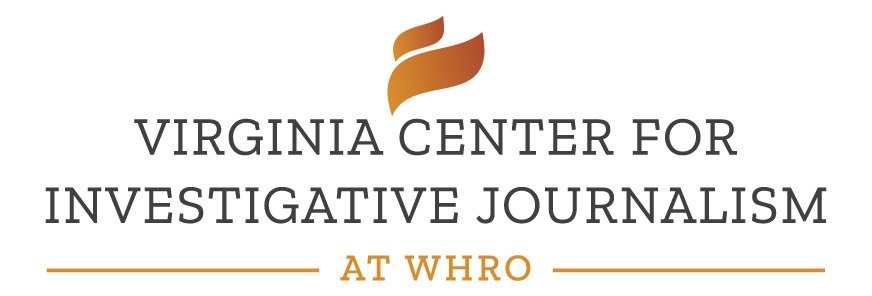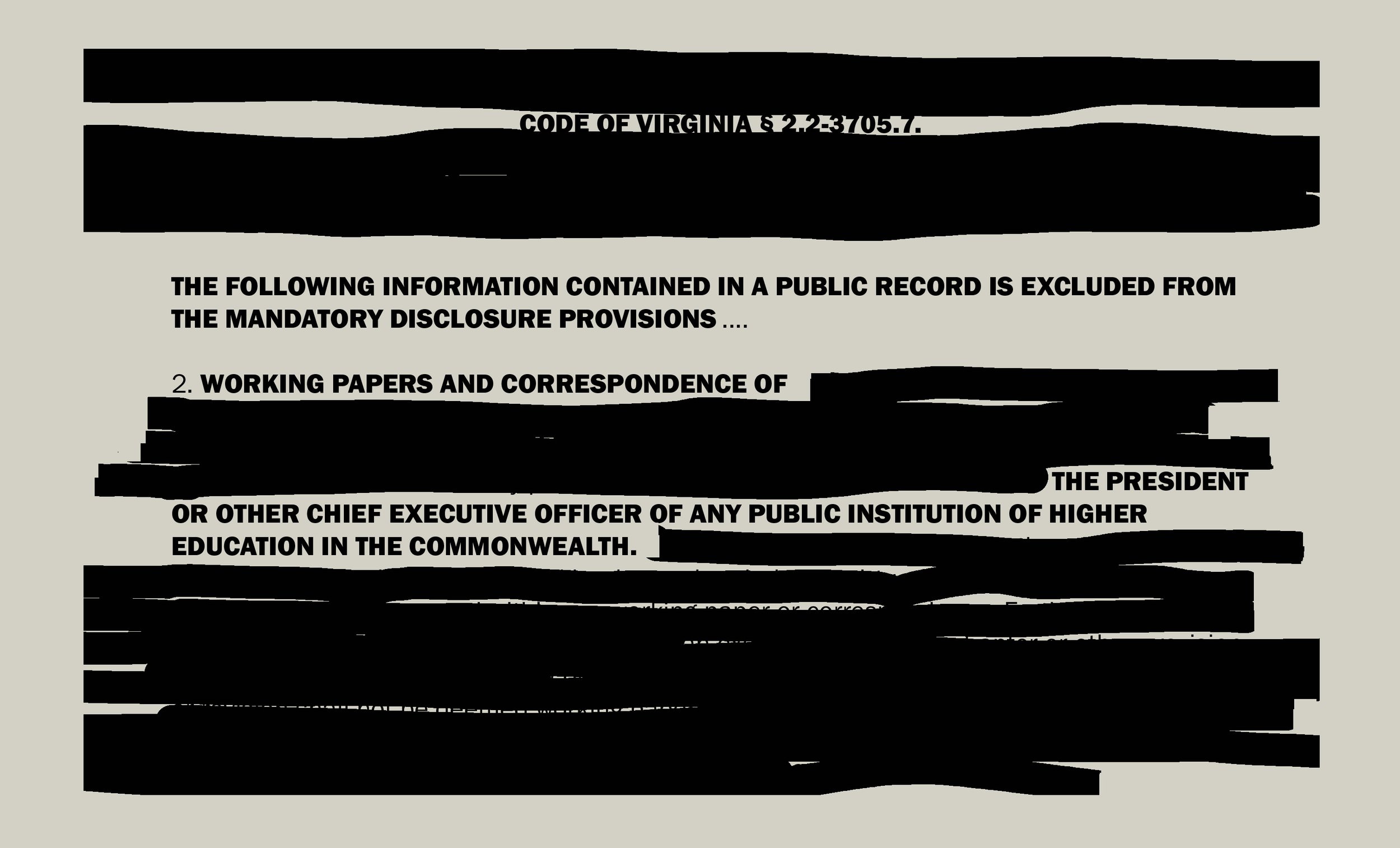A provision in state law exempts college presidents’ “working papers and correspondence” from disclosure even after they step down — as we found out when we asked about one ex-president’s role in campus expansions that uprooted a Black neighborhood
By Brandi Kellam
Virginia Center for Investigative Journalism at WHRO
and Gabriel Sandova
ProPublica
This article was produced for ProPublica’s Local Reporting Network in partnership. This story was co-published with ProPublica and The Chronicle of Higher Education.
This past May, we were working on a story about how the establishment and expansion of Virginia’s Christopher Newport University dismantled a vibrant Black neighborhood. When we asked university officials for archival material, we encountered something we hadn’t heard about before. We learned that in Virginia, the papers of state university presidents are largely exempt from public records laws.
We asked for several boxes containing some of the papers of Paul Trible, the university’s president from 1996 to 2022, which pertained to real estate acquisitions, board meetings and development projects. Since the city of Newport News seized the core of the Black community for a new campus in the early 1960s, Christopher Newport has bought almost all of the remaining homes there.
We hoped the records would show how Trible’s administration obtained properties in the Shoe Lane area abutting the campus and reveal any internal debates about its actions. We wanted to know whether the university encouraged or pressured homeowners to sell and whether it used or threatened to use eminent domain, the government’s right to forcibly purchase private property for public use.
As a public institution, Christopher Newport is subject to the state public records law. But the university would not let us see the vast majority of Trible’s documents. It cited a 49-year-old amendment, section 2.2-3705.7 of the Virginia code, exempting the “working papers and correspondence” of “the president or other chief executive officer of any public institution of higher education in the Commonwealth” from disclosure. Since Trible, now a Christopher Newport distinguished professor, was unavailable for an interview, the lack of access to his communications left unanswered questions, such as why the university’s governing board approved taking properties by eminent domain in 2005 after he publicly said there was no need to do so.
Virginia may have the broadest and most explicit exemption for college presidents’ papers in the country, based on a guide from the Reporters Committee for Freedom of the Press. While university presidents have said that public scrutiny would hamper frank dialogue and “reflective” decision making, the exemption renders their perspectives — and the schools’ inner workings — less visible to the media and Virginia taxpayers. Legislative proposals to repeal or narrow it have failed in the face of opposition from the higher education lobby.
Virginia universities aren’t required to invoke the exemption — they can provide the information if they choose. But we were far from the first journalists to be thwarted by this provision. It came into play in 2006 when Old Dominion University rejected a request from a Virginia newspaper for an evaluation prepared for its president of a mandatory course that students had criticized. William & Mary cited the exemption in 2007 in denying requests from news outlets and alumni related to a donor’s decision to revoke $12 million in pledges, though it later reversed itself and released a sought-after email. Also, in 2022, William & Mary withheld 17 pages from a public radio reporter seeking information about “lab school design concepts.” And the University of Virginia wielded the exemption during a firestorm in 2014 over a Rolling Stone article, which was subsequently retracted, about an alleged rape on campus.
Moreover, as Christopher Newport’s denial of our request for some of Trible’s papers highlights, the amendment doesn’t say how far back the exemption goes or whether it applies to former presidents. Open records advocates said that, based on their reading of the statute, the exemption should only apply to ongoing deliberations. Nearly 30 states protect such deliberations by university officials from disclosure.
“The intention of this exemption was to provide decision-makers with some breathing room to make decisions,” said Megan Rhyne, executive director of the Virginia Coalition for Open Government, a nonprofit that presses for access to public records. “It was never intended to be a black box in which all their papers and correspondence get put into and locked away forever.”
But the Virginia Freedom of Information Advisory Council, a state agency that helps resolve public records disputes, has taken the position that the statute’s silence makes it impossible to set a time limit. “FOIA doesn’t address everything,” senior attorney Joseph Underwood said. “There are dark corners.”
In a 2004 opinion, the council’s executive director wrote that any cutoff date “would require clear language of intent from the General Assembly that the exemption no longer applies after a certain number of years after the creation of a record.”
Asked about Christopher Newport’s use of the exemption, university spokesperson Jim Hanchett said in a statement that the university “is committed to meeting its open government obligations and at all times acting in accordance with the Commonwealth of Virginia’s open record laws.”
In a Sept. 18 message to faculty and staff, Christopher Newport president Bill Kelly acknowledged that the university’s progress “has come at a human cost, and we must continue to learn about and understand our complicated history.” The city chose a site for Christopher Newport, which was then a branch of the Colleges of William and Mary system, on land “that was home to a valuable and well-established neighborhood,” Kelly wrote. “The residents of that neighborhood, most of them African Americans, lost their homes, many due to the use of eminent domain.” This “important chapter … is appropriately receiving renewed attention,” he added in an apparent reference to our Sept. 5 article.
Like Christopher Newport, Old Dominion and UVA have grown by displacing Black residents. An Old Dominion spokesperson said that it has focused on improving relations with the surrounding neighborhood and that students of color now make up the majority of its enrollment. UVA has established presidential commissions to examine its role in slavery and segregation, and has set a goal of developing 1,500 affordable units in university properties.Those schools also said that they abide by state public records law, giving similar explanations to Christopher Newport’s. William & Mary said it follows guidance from the Virginia Freedom of Information Advisory Council and gives “careful consideration” to “the documents requested and the context in which they were created and have been used.”
To be sure, several states including Pennsylvania and Delaware go even further in shielding universities, though they don’t single out presidential papers. In Pennsylvania law, four universities — Penn State, the University of Pittsburgh, Temple University and Lincoln University — are categorized as “state-related” rather than “state-affiliated,” a distinction that exempts them from disclosing most information. The University of Delaware and Delaware State University are not considered “public bodies” under Delaware law, though they receive taxpayer funding.
Enacted in 1968, Virginia public records law exempts officials such as the governor, the lieutenant governor, the attorney general, state legislators and mayors. It added university presidents to the list in 1974, even as the Watergate scandal was prompting calls for increased transparency. James T. Edmunds, a Democratic state senator and a graduate of the University of Richmond’s law school, introduced the change. It was a turnaround from a stance Edmunds had taken the previous year, when he had supported a bill to make public the actions taken by university governing boards, saying that news reporters deserved more access.
After leaving the state Senate, Edmunds served on the board of the Virginia community college system and practiced law. His career came to an abrupt halt in 1987 when he admitted to stealing more than $170,000 from clients. He served 10 months in prison and surrendered his law license, which was reinstated in 1995. Edmunds died in 2008.
It’s unclear why Edmunds proposed the presidential exemption. His widow, Harriett Edmunds, who worked as a legislative aide before they were married, said she didn’t recall. “I do know that he was interested in the community college system,” she said. “That was one of his major, major interests.”
A November 2014 Rolling Stone article indirectly fueled a debate over Virginia’s presidential exemption. The article, which concerned an alleged rape at a University of Virginia fraternity, was discredited and retracted. But news outlets, hoping to sift fact from fiction and learn how the university handled sexual misconduct cases, barraged UVA with requests for its president’s correspondence. UVA deflected them, citing the exemption. A spokesperson said the university no longer has copies of those requests.
Amid the fallout, two legislators filed proposals in 2015 to eliminate the presidential exemption. Then-delegate David Ramadan, a former member of George Mason University’s governing board, who sponsored one of the bills, told us that he “thought there were a lot of good things” university presidents “were doing that should be out in the public and shouldn’t be hidden.”
The bills died in committee, but the Virginia Freedom of Information Advisory Council took up the issue. College presidents fought back, arguing that secrecy was needed to foster candid discussions. “The removal of this exemption would hinder our ability to embrace reflective decision-making,” the Council of Presidents wrote in July 2015. “As the law currently allows, neither university presidents nor those that advise us are inhibited in communication due to fear of our preliminary discussions becoming public and thus inaccurately reported, taken out of context, viewed as final when far from it, and quite possibly politicized.” The letter did not address the exemption’s use to shield the papers of former presidents.
Among the signatories to the letter was Trible, Christopher Newport’s then-president. A former Republican politician and U.S. senator, he was Christopher Newport’s longest-serving president; its library is named for him and his wife. Ultimately, the advisory council called for tightening the exemption by limiting it to “working papers” and making available the correspondence of presidents and other officials, but the legislature didn’t adopt the recommendation.
Despite Christopher Newport’s denial of our request for Trible’s papers, our reporting continued to raise questions about his role in uprooting Black families. For example, we learned that, although university officials had vowed not to pressure residents to sell, Trible wrote to at least one homeowner, encouraging sales talks.
In July, we sent another request to Christopher Newport. We were interested in a house on Prince Drew Road, long owned by a Black family, that the university’s board had approved taking by eminent domain for a parking lot during Trible’s administration. A university spokesperson told us that its real estate foundation bought the building without resorting to eminent domain, but we wanted to learn more.
In response, the university said it had two pages of presidential correspondence about the property. It refused to give us those pages, citing the exemption. Trible again could not be reached for comment, and a university spokesperson did not respond to our request to contact him.
Louis Hansen, of the Virginia Center for Investigative Journalism at WHRO, contributed reporting.


